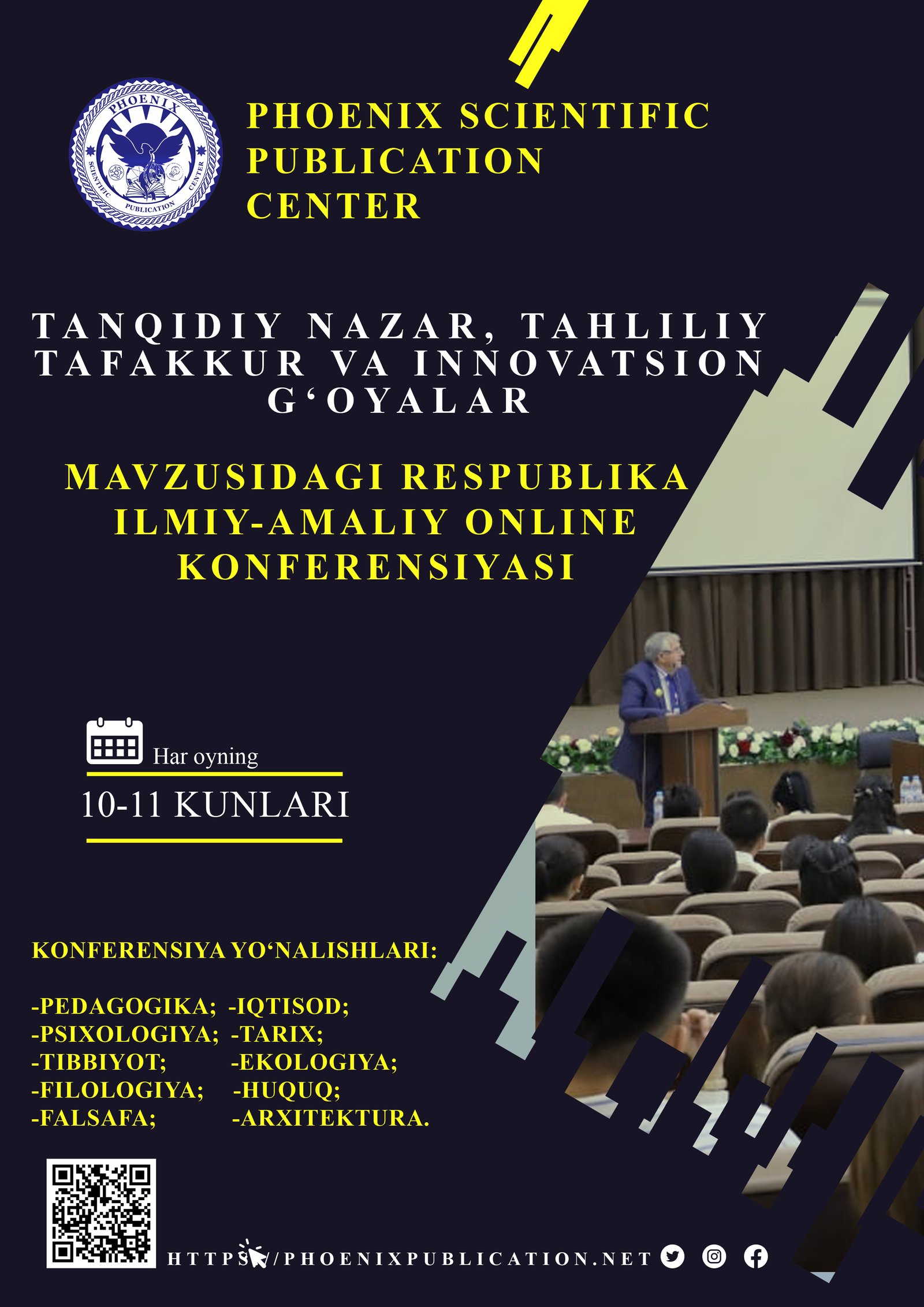Abstract
This article explores effective strategies for developing students’ ability to apply chemical knowledge in everyday life, a key component of functional scientific literacy. In the context of modern education, it is increasingly important that students understand not only chemical theories, but also their relevance and practical application in real-world situations. The study identifies pedagogical methods that promote contextual learning, such as problem-based learning, inquiry-oriented activities, and interdisciplinary tasks. Emphasis is placed on designing lessons that bridge the gap between academic content and students' daily experiences, including environmental issues, household chemistry, and health-related contexts. The paper also discusses the role of teacher guidance, curriculum flexibility, and assessment tools in supporting the transfer of classroom knowledge to everyday decision-making. The findings highlight that when chemistry education is connected to real-life applications, students become more engaged, motivated, and better prepared to act as scientifically informed citizens.
References
1) Bennett, J., & Lubben, F. (2006). Context-based chemistry: The Salters approach. International Journal of Science Education, 28(9), 999–1015.
2) Xoliyorova S., Tilyabov M., Pardayev U. Explaining the basic concepts of chemistry to 7th grade students in general schools based on steam //Modern Science and Research. – 2024. – Т. 3. – №. 2. – С. 362-365.
3) Xayrullo o'g P. U. B., Rajabboyovna K. X. Incorporating Real-World Applications into Chemistry Curriculum: Enhancing Relevance and Student Engagement //FAN VA TA'LIM INTEGRATSIYASI (INTEGRATION OF SCIENCE AND EDUCATION). – 2024. – Т. 1. – №. 3. – С. 44-49.
4) Gilbert, J. K. (2006). On the nature of “context” in chemical education. International Journal of Science Education, 28(9), 957–976.
5) Xayrullo o'g P. U. B., Umurzokovich T. M. Inquiry-Based Learning in Chemistry Education: Exploring its Effectiveness and Implementation Strategies //FAN VA TA'LIM INTEGRATSIYASI (INTEGRATION OF SCIENCE AND EDUCATION). – 2024. – Т. 1. – №. 3. – С. 74-79.
6) Pardayev U. et al. THE EFFECTS OF ORGANIZING CHEMISTRY LESSONS BASED ON THE FINNISH EDUCATIONAL SYSTEM IN GENERAL SCHOOLS OF UZBEKISTAN //Journal of universal science research. – 2024. – Т. 2. – №. 4. – С. 70-74.
7) King, D. (2012). New perspectives on context-based chemistry education: Using a model of contextual learning to design and assess teaching sequences. Studies in Science Education, 48(1), 51–87.
8) Choriqulova D. et al. The role of the method of teaching chemistry to students using the" assessment" method //Modern Science and Research. – 2024. – Т. 3. – №. 11. – С. 256-264.
9) Narzullayev M. et al. THE METHOD OF ORGANIZING CHEMISTRY LESSONS USING THE CASE STUDY METHOD //Modern Science and Research. – 2024. – Т. 3. – №. 5. – С. 119-123.
10) Amangeldievna J. A., Xayrullo o'g P. U., Shermatovich B. J. Integrated teaching of inorganic chemistry with modern information technologies in higher education institutions //FAN VA TA'LIM INTEGRATSIYASI (INTEGRATION OF SCIENCE AND EDUCATION). – 2024. – Т. 1. – №. 3. – С. 92-98.
11) Amangeldievna J. A. et al. THE ROLE OF MODERN INFORMATION TECHNOLOGIES IN CHEMICAL EDUCATION //International journal of scientific researchers (IJSR) INDEXING. – 2024. – Т. 5. – №. 1. – С. 711-716.
12) Van Driel, J. H., Beijaard, D., & Verloop, N. (2014). Professional development and reform in science education: The role of teachers' practical knowledge. Journal of Research in Science Teaching, 38(2), 137–158.
13) Abdukarimova M. A. Q. et al. Tabiiy fanlar o ‘qitishda STEAM yondashuvi //Science and Education. – 2024. – Т. 5. – №. 11. – С. 237-244.
14) Xayrullo o'g P. U. et al. The importance of improving chemistry education based on the STEAM approach //fan va ta'lim integratsiyasi (integration of science and education). – 2024. – Т. 1. – №. 3. – С. 56-62.
15) O‘G‘Li U. B. X. et al. The effectiveness of using modern information and communication technologies (ICT) in chemistry education //Science and Education. – 2025. – Т. 6. – №. 2. – С. 350-363.
16) Tilyabov M., Pardayev U. KIMYO DARSLARIDA O ‘QUVCHILARNI LOYIHAVIY FAOLIYATGA JALB QILISH USULLARI //Modern Science and Research. – 2025. – Т. 4. – №. 5. – С. 42-44.
17) Pardayev U., Abdullayeva B., Abduraximova M. ZAMONAVIY VIRTUAL LABORATORIYA PLATFORMALARIDAN FOYDALANIB KIMYO FANINI O ‘QITISH SAMARADORLIGINI OSHIRISH //Modern Science and Research. – 2025. – Т. 4. – №. 5. – С. 48-50.
18) Xayrullo o‘g, P. U. B. (2025, June). CHEMICAL ANALYSIS-BASED ASSESSMENT OF THE HERBICIDAL EFFICIENCY OF AZIDO-SUBSTITUTED TRIAZINES. In CONFERENCE OF ADVANCE SCIENCE & EMERGING TECHNOLOGIES (Vol. 1, No. 2, pp. 53-62).
19) Xayrullo o‘g, P. U. B. (2025). INVESTIGATION OF THE REPELLENT ACTIVITY AGAINST IXODID TICKS BASED ON THE STRUCTURAL AND PHYSICOCHEMICAL PROPERTIES OF DIBUTYL ADIPATE. TANQIDIY NAZAR, TAHLILIY TAFAKKUR VA INNOVATSION G ‘OYALAR, 2(1), 265-273.
20) Shernazarov I. et al. Methodology of using international assessment programs in developing the scientific literacy of future teachers //Spast Abstracts. – 2023. – Т. 2. – №. 02.
21) Ergashovich S. I., Umurzokovich T. M. Preparation for International Assessment Research by Forming Types of Functional Literacy in Future Chemistry Teachers //Web of Technology: Multidimensional Research Journal. – 2023. – Т. 1. – №. 7. – С. 49-53.
22) Тилябов М. НАУЧНОЕ ЗНАЧЕНИЕ ПОДГОТОВКИ СТУДЕНТОВ К МЕЖДУНАРОДНОМУ ОЦЕНОЧНОМУ ИССЛЕДОВАНИЮ //Предпринимательства и педагогика. – 2024. – Т. 5. – №. 2. – С. 108-120.
23) Tilyabov M. U. DEVELOPING FUNCTIONAL LITERACY AND LOGICAL THINKING IN CHEMISTRY EDUCATION //Web of Teachers: Inderscience Research. – 2025. – Т. 3. – №. 5. – С. 154-161.
24) Sadler, T. D. (2004). Informal reasoning regarding socioscientific issues: A critical review of research. Journal of Research in Science Teaching, 41(5), 513–536.
